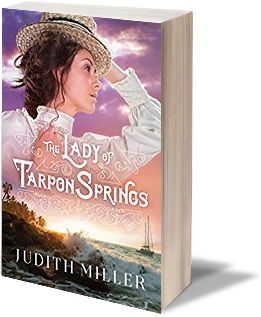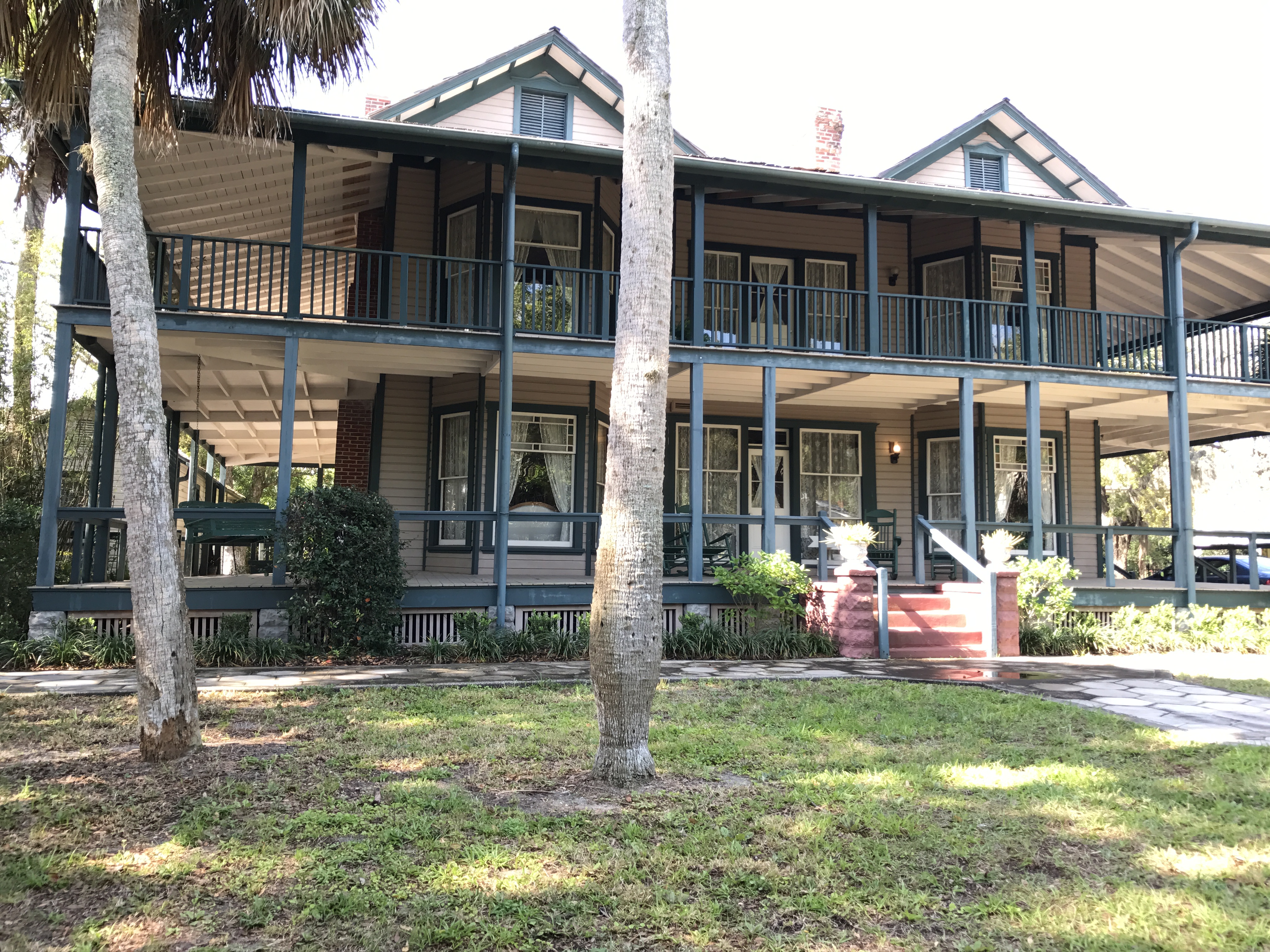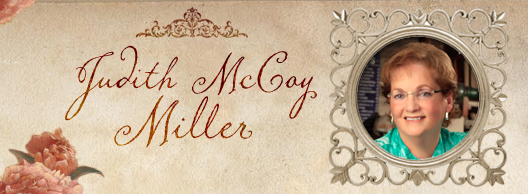A little Tarpon Springs history
In my recent newsletter, I told you a little about The Lady of Tarpon Springs. I thought you might like to learn a little more, so, like the gal on the cover, hang onto your hats. As I told you, the book is set in Tarpon Springs, Florida. While the Greeks who immigrated to the town have played a key role in the growth and expansion of the community, Tarpon Springs was settled and a small, yet growing community.
I told you a little about The Lady of Tarpon Springs. I thought you might like to learn a little more, so, like the gal on the cover, hang onto your hats. As I told you, the book is set in Tarpon Springs, Florida. While the Greeks who immigrated to the town have played a key role in the growth and expansion of the community, Tarpon Springs was settled and a small, yet growing community.
Like other similar locations, many of the wealthy Victorian residents considered the town a winter retreat for the wealthy. The area that circles Spring Bayou is known as the “Golden Crescent” and there are some gorgeous Victorian homes. Governor Safford Built a house there for his family in 1883. His sister, Dr. Mary Jane Safford, was the first woman to practice medicine in Florida.
 After both Governor Anson Safford and Mary Jane died in 1891, Anson’s widow sold the valuable waterfront property, but The Safford House was moved to its present location at 23 Parkin Court. Governor Safford’s widow rented out rooms to boarders and added the wrap-around porch on the top floor after the house was moved. The City has now acquired and restored the house and opened it as a museum. I had the opportunity to visit the Safford House while I was in Tarpon Springs. If you’re in the area and enjoy history, you should be sure to take time for a visit. This is their home at the left.
After both Governor Anson Safford and Mary Jane died in 1891, Anson’s widow sold the valuable waterfront property, but The Safford House was moved to its present location at 23 Parkin Court. Governor Safford’s widow rented out rooms to boarders and added the wrap-around porch on the top floor after the house was moved. The City has now acquired and restored the house and opened it as a museum. I had the opportunity to visit the Safford House while I was in Tarpon Springs. If you’re in the area and enjoy history, you should be sure to take time for a visit. This is their home at the left.
If you visit the historic downtown area, you’ll soon discover street names such as: Lime, Orange, Pineapple, Banana and Lemon. Those street names led to the area being nicknamed the “Fruit Salad District” of Tarpon Springs.
In The Lady of Tarpon Springs, Lucy Penrose is the doctor in Tarpon Springs and the best friend of my female protagonist, Zanna Krykos who is a lawyer. They are both independent young ladies who were somewhat ahead of their time insofar as their professions. However, the fact that there was a female doctor in Tarpon Springs in the late 1890s validated my idea and made it even more fun to include Lucy in my cast of characters.
So what historic towns have you visited an enjoyed? I’m always on the lookout for new ideas and places and visit and summer is the perfect time.
Judy


Hi, Judith!
I just bought your new book from Amazon, and am excited to begin reading it, since I’m a Florida native, and LOVE the history
of Florida, and some other states. I live in Jacksonville, Florida, the biggest city in the continental United States with over 840 square miles.
I was born here, and lived here almost all of my life, so I know a lot about my hometown. I’m sending you a lot of facts about our rich, RICH history, and believe me, when you start researching Jacksonville, you’ll fall in love with it. We have so many fascinating stories in our past.
I’m also posting this on your blog, I hope you won’t mind!!
Before I tell you the fast facts, which I hope will pique your interest sometime soon, I’ll tell you I’ve been to St. Augustine plenty of times. I had my honeymoon there, took my daughters there when they were young, spent a birthday there, riding the Red Trolley and learning about St. Augustine, and we also have been there during Christmas time, to see their Night of Lights, which was real pretty. We walked downtown there after we had dinner at the Santa Maria restaurant, which was right over the water, and you could feed fish from your table through little holes in the sides of the restaurant. Sadly, Santa Maria is being demolished. Anyways, Jacksonville has Fort Caroline, and each year they host a Civil War reenactment, complete with costumes actors, tents, overnight stay, and a little mock battle. I’ve seen that too.)
Anyways, Jacksonville has Fort Caroline, and each year they host a Civil War reenactment, complete with costumes actors, tents, overnight stay, and a little mock battle. I’ve seen that too.)
We have the beautiful Dupont Mansion, aka Epping Forest: https://en.wikipedia.org/wiki/Epping_Forest_(Jacksonville)
Kingsley Plantation: https://nefloridafacesandplaces.wordpress.com/tag/kingsley-plantation/
Fort Caroline: https://en.wikipedia.org/wiki/Fort_Caroline ( I regularly walk through here, in the winter, it’s wonderfully quiet!!)
So, here are some more facts about my hometown, Jacksonville, Florida, and a couple of repeat facts, for your enjoyment:
Jacksonville is the largest city in the continental United States with over 840 square miles.
Jacksonville was named for General Andrew Jackson, the first military governor of Florida who, incidentally, never visited Jacksonville
Duval Street, like the county, was named for William Pope Duval, the first Territorial Governor of Florida.
Fort Caroline is a near full-scale rendering created to memorialize the 16th century French effort to establish a permanent colony in Florida.
The fire of 1901, sparked from a chimney and igniting a fiber factory, destroyed the heart of the city – 146 city blocks and 2,368 buildings were destroyed. Some 8,677 residents were left homeless and seven people died. The damage was $15 million – $2 billion today.
In the early 1900s the Ostrich Farm, located on what is today’s Southbank of Downtown, was the city’s biggest tourist draw.
The Alhambra Theatre and Dining is the longets running professional dinner theatre in the nation. (been here for dinner and show several times)
When Friendship Fountain opened in 1965, it was billed as the world’s largest and tallest fountain.(we’ve had a LOT of fun here)
Planted in 1822, Treaty Oak, located on the Southbank of Downtown has a circumference of 25 feet and reaches more than 70 feet into the sky. This is Jacksonville’s oldest resident. (I used to go here in the 1970s with friends)
The Dames Point Bridge opened in 1989 at a cost of $117 million dollars. It is the second longest concrete cable-stayed bridge in the Western Hemisphere. (I remember when it opened, we had a parade cross over the bridge, with an elephant!!)
Jacksonville proudly boasts the largest urban park system in the country with more than 80,000 acres including 400 city parks, seven state parks, two national parks and dozens of gardens and arboretums.(I love our parks, in the winter time. No “skeeters to bite me)
I”ve been to the Kingsley Plantation, too: https://www.nps.gov/timu/learn/historyculture/kp_history.htm
I love visiting Fort Caroline: Fort Caroline
Fort Caroline is a historic rebuilding of the fort settled by French colonists in 1564. Signs inside tell the story of the settlers versus the Timucua Native Americans and the Spanish. Within the first year, relations went south with the Native Americans. The Spanish already had a hold of territory in South America and were desperate to take over North America as well. In 1565, the French colony was raided by the Spanish. The fort that resides there now is a replica of what the fort is believed to have looked like, complete with cannons and flags. The top levels of the fort offer a beautiful view of the mouth of the St. Johns River. When you leave the fort, you’ll see a replica of a Timucua hut, complete with an in-progress canoe.
There is a 1.3-mile nature trail at the park. It is a loop trail, winding through maritime and hardwood hammock. There are big, sandy hills here, only flattening when you reach the section of the trail covered by saw palmettos below and pines above. At peaks, if the brush isn’t too thick, you can see the St. Johns River again. The breeze coming off the water is cooling. The trail is shaded by live oaks, giving refuge from the hot Florida sun. There are plenty of benches along the trail if you need to take a break or simply want to enjoy the scenery of Old Florida.
In Jesus,
Nancy Brown
Hi Nancy,
Thank you so much for your response and all the wonderful information regarding Florida. I’m thrilled to learn more about Florida history. My daughter lived outside Orlando for a number of years and my brother winters in Florida so I plan to visit sometime this winter. I think I’ll see if I can visit a couple of these places while I’m down there. I hope you enjoy The Lady of Tarpon Springs. It was really fun visiting and researching the area.
Blessings,
Judy